WASHINGTON: US peace talks with the Taliban are now “dead,” President Donald Trump declared Monday, two days after he abruptly canceled a secret meeting he had arranged with Taliban and Afghan leaders aimed at ending America’s longest war.
Trump’s remark to reporters at the White House suggested he sees no point in resuming a nearly yearlong effort to reach a political settlement with the Taliban, whose protection of Al-Qaeda extremists in Afghanistan prompted the US to invade after the 9/11 attacks.
Asked about the peace talks, Trump said: “They’re dead. They’re dead. As far as I’m concerned, they’re dead.”
It’s unclear whether Trump will go ahead with planned US troop cuts and how the collapse of his talks will play out in deeply divided Afghanistan.
Trump said his administration is “looking at” whether to proceed with troop reductions that had been one element of the preliminary deal with the Taliban struck by presidential envoy Zalmay Khalilzad.
“We’d like to get out, but we’ll get out at the right time,” Trump said.
What had seemed like a potential deal to end America’s longest war unraveled, with Trump and the Taliban blaming each other for the collapse of nearly a year of US-Taliban negotiations in Doha, Qatar.
The insurgents are now promising more bloodshed, and American advocates of withdrawing from the battlefield questioned on Monday whether Trump’s decision to cancel what he called plans for a secret meeting with Taliban and Afghan leaders at the Camp David, Maryland, presidential retreat over the weekend had poisoned the prospects for peace.
“The Camp David ploy appears to have been an attempt to satisfy Trump’s obsession with carefully curated public spectacles — to seal the deal, largely produced by special envoy Zalmay Khalilzad and Taliban negotiators, with the president’s imprimatur,” said John Glaser director of foreign policy studies at the Cato Institute.
Trump has been talking of a need to withdraw US troops from the “endless war” in Afghanistan since his 2016 presidential campaign. And he said anew in a tweet on Monday, “We have been serving as policemen in Afghanistan, and that was not meant to be the job of our Great Soldiers, the finest on earth.”
He added, without explanation, “Over the last four days, we have been hitting our Enemy harder than at any time in the last ten years.”
There has been no evidence of a major US military escalation.
Secretary of State Mike Pompeo defended Trump’s weekend moves.
“When the Taliban tried to gain negotiating advantage by conducting terror attacks inside of the country, President Trump made the right decision to say that’s not going to work,” Pompeo said Sunday.
Trump said he called off negotiations because of a recent Taliban bombing in Kabul that killed a US service member, even though nine other Americans have died since June 25 in Taliban-orchestrated violence. But the emerging agreement had started unraveling days earlier after Afghan President Ashraf Ghani postponed his trip to Washington and the Taliban refused to travel to the US before a deal was signed, according to a former senior Afghan official.
As Trump’s re-election campaign heats up, his quest to withdraw the remaining 13,000 to 14,000 US troops from Afghanistan remains unfulfilled — so far.
At the Pentagon, spokesman Jonathan Hoffman declined Monday to comment on the outlook for the administration’s plan to reduce the US troop level in Afghanistan to 8,600.
Democrats said Trump’s decision to nix a deal with the Taliban was evidence that he was moving too quickly to get one. Far from guaranteeing a cease-fire, the deal only included Taliban commitments to reduce violence in Kabul and neighboring Parwan province, where the US has a military base.
The Taliban have refused to negotiate with the Afghan government it sees as illegitimate and a puppet of the West. So, the Trump administration tried another approach, negotiating with the Taliban first to get a deal that would lead to Taliban talks with Afghans inside and outside the government.
Some administration officials, including national security adviser John Bolton, did not back the agreement with the Taliban as it was written, a US official familiar with the negotiations said. They didn’t think the Taliban can be trusted. Bolton advised the president to draw down the US force to 8,600 — enough to counter terror threats — and “let it be” until a better deal could be hammered out, the official said.
The official spoke on condition of anonymity to discuss private deliberations.
Khalilzad, the lead US negotiator, recently announced that he had reached an agreement in principle with the Taliban. Under the deal, the US would withdraw about 5,000 US troops within 135 days of signing. In exchange, the insurgents agreed to reduce violence and prevent Afghanistan from being used as a launch pad for global terror attacks, including from a local Islamic State affiliate and Al-Qaeda.
Pompeo said the Taliban agreed to break with Al-Qaeda — something that past administrations have failed to get the Taliban to do.
The insurgent group hosted Al-Qaeda leader Osama bin Laden as he masterminded the 9/11 attacks in 2001. After the attacks, the US ousted the Taliban, which had ruled Afghanistan with a harsh version of Islamic law from 1996 to 2000.
But problems quickly emerged. On Thursday, a second Taliban car bomb exploded near the US Embassy in Kabul, killing 12 people including a US soldier. Khalilzad abruptly returned to Doha, Qatar, for more negotiations with the Taliban. He has since been recalled to Washington.
It’s unclear if the talks will resume because the Taliban won’t trust future deals they negotiate with the US if they think Trump might then change course, according to the former senior Afghan official, who was not authorized to discuss the issue and spoke only on condition of anonymity. The official, who has discussed the peace process with US and Afghan officials, said Khalilzad’s team was not aware of Trump’s plans to tweet the end of the talks Saturday evening.
Trump’s suspension of the negotiations “will harm America more than anyone else,” the Taliban said in a statement.
The former Afghan official said the deal fell apart for two main reasons. First, the Taliban refused to sign an agreement that didn’t state the end date for a complete withdrawal of American forces. That date was to be either November 2020, the same month of the US presidential election, or January 2021, he said.
The US-Taliban agreement was to be followed by Taliban talks with Afghans inside and outside the government to chart a political future for the country. Ghani told Khalilzad that putting a withdrawal date in the agreement would undermine the all-Afghan discourse before it began.
Secondly, the US was unsuccessful in convincing Ghani to postpone the Afghan presidential election set for Sept. 28, the official said. The US argued that if the elections were held and Ghani won, his opponents and other anti-Ghani factions would protest the results, creating a political crisis that would make the all-Afghan talks untenable. Other disagreements included why the deal did not address the Taliban’s linkages to Pakistan and prisoner-hostage exchanges, the official said.
Trump says peace talks with Taliban are now ‘dead’
Trump says peace talks with Taliban are now ‘dead’
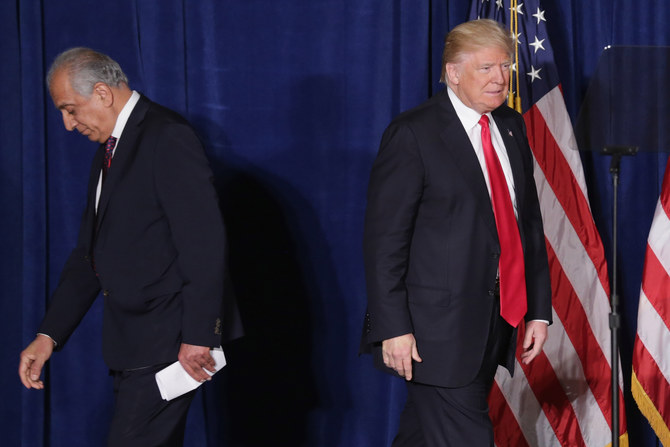
- US administration "looking at" whether to proceed with the planned troop reductions
- Insurgents have vowed more bloodshed in Afghanistan after peace talks fall through
IMF demands Pakistan secure parliamentary approval on reforms for loan agreement— official
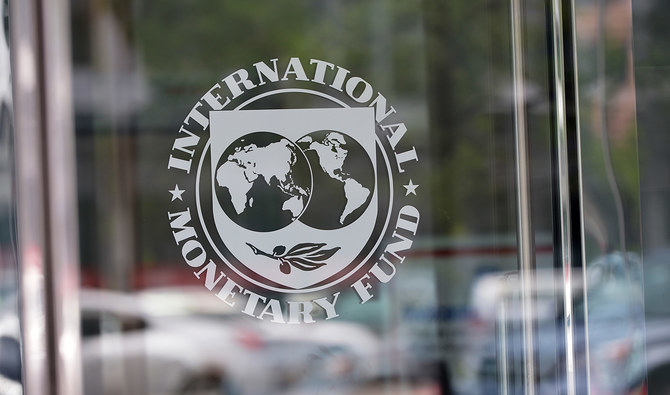
- Government will present “prior actions” needed to secure IMF loan in federal budget next month, says finance ministry official
- Leading economist says Pakistan left with no option but to secure IMF bailout to meet external financing needs of $80 billion
ISLAMABAD: The International Monetary Fund (IMF) has asked Pakistan to seek parliamentary approval on major economic reforms related to the energy, power, tax sectors and on the privatization of state-owned enterprises (SOEs) before starting formal talks for another loan program, a finance ministry official said on Thursday.
Facing low foreign exchange reserves, currency devaluation and high inflation, Pakistan last month completed a short-term $3 billion IMF program that helped stave off a sovereign default. However, the government of Prime Minister Shehbaz Sharif has stressed the need for a fresh, longer-term program with the global lender.
An IMF mission reached Islamabad last week to negotiate with Pakistani authorities for a fresh bailout program, holding talks with officials on reforms in key economic sectors. The mission is wrapping up its visit today, Thursday, without reaching any staff-level agreement with Islamabad.
The government would present the economic reforms demanded by IMF or “prior actions” in parliament in the Finance Bill 2024-25 likely to be presented on June 7, the finance ministry official with knowledge of the negotiations, said on condition of anonymity.
“The IMF has suggested authorities to get parliamentary approval for the new loan program’s targets and conditions before initiation of the formal talks,” the official told Arab News.
“In fact, these are the prior actions that Pakistan is required to take care of before reaching a staff-level agreement with the Fund for the new bailout package.”
The international lender has urged Islamabad to overhaul its SOEs and introduce tax, energy and power reforms. Pakistan has had to take painful measures in line with the IMF’s demands since 2022, which included hiking fuel and food prices.
The finance ministry official said the government intends to introduce key reforms in the energy and power sectors in line with the IMF’s demands, besides broadening the tax base through progressive initiatives.
“The government will take all parliamentary parties into confidence over the digitalization of the Federal Board of Revenue and the privatization of the SOEs,” he added.
Sajid Amin, a senior economist and deputy executive director at the Sustainable Development Policy Institute (SDPI), said the government had “no option but to secure the IMF loan program.” He said the IMF’s program was critical in helping Pakistan meet its external financing needs of around $80 billion in the next three years.
“The IMF wants political ownership of the loan program and that’s why it is pushing the government to get all the targets and conditions approved by the parliament,” Amin told Arab News.
“The biggest challenge for the government is to convince the coalition partners and opposition over its reforms agenda to secure the IMF loan,” he said.
Amin warned the upcoming IMF program would be the “toughest” one for the government as it would not be easy for it to complete it.
Tickets for Pakistan-Saudi Arabia football World Cup qualifier go up for sale
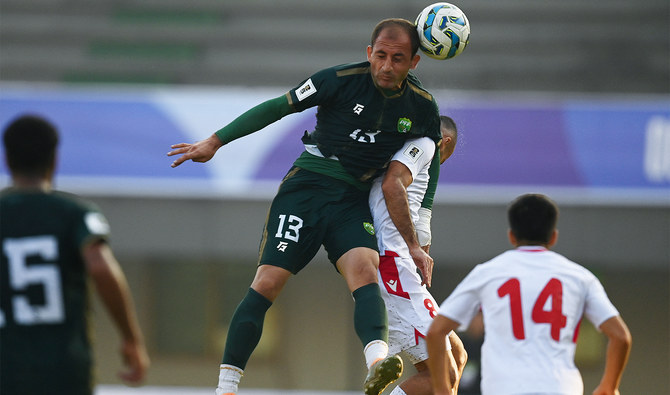
- Pakistan and Saudi Arabia will play against each other in Islamabad on June 6 for round two of World Cup qualifier
- Saudi Arabia beat Pakistan 4-0 in November 2023 when the two sides met each other for first round of qualifiers
ISLAMABAD: Tickets for Pakistan’s upcoming FIFA World Cup 2026 Qualifier Round 2 home-leg match against Saudi Arabia are officially on sale, the Pakistan Football Federation (PFF) announced on Thursday.
Pakistan and Saudi Arabia will lock horns at the Jinnah Football Stadium in Islamabad on June 6, with the match scheduled to kick off at 8:30 p.m. Pakistan Standard Time.
Pakistan is in Group G of the FIFA World Cup Qualifiers with Saudi Arabia, Jordan and Tajikistan. The South Asian country will face Tajikistan on June 11 in an away fixture.
A total of 36 football squads have been split into nine groups with four teams each in the second round of qualifiers. The winners and runners-up from each group would progress through to the third round.
“In a bid to make the event accessible to all football enthusiasts, ticket prices have been thoughtfully set at budget-friendly rates,” the PFF said in a media release, adding that tickets were available at Bookme.pk website.
It said tickets for the Premium Plus enclosures were set at Rs4,000 [$14.37] while the Premium enclosure tickets were priced at Rs1,500 [$5.39]. The General enclosure tickets are being sold for Rs750 [$2.69].
Saudi Arabia thrashed Pakistan 4-0 when the two sides met in November 2023 for their first clash of the FIFA World Cup qualifiers in Al Ahsa.
Preliminary Pakistan squad
Goalkeepers: Hassan Ali and Tanveer
Defenders: Haseeb Khan, Mamoon Moosa Khan, Huzaifa, Waqar Ihtisham, Abdul Rehman, Umar Hayat, Muhammad Adeel, Muhammad Saddam and Zain ul Abideen
Midfielders: Yasir Arafat, Alamgir Ghazi, Ali Uzair, Rajab Ali, Moin Ali, Junaid Ahmed and Fahim
Forwards: Adeel Younas, Shayak Dost, Ali Zafar and Fareedullah
The PFF said the names of diaspora players joining the national training camp later would be included in the final squad.
Heat wave cancels lessons for half of Pakistan’s schoolchildren
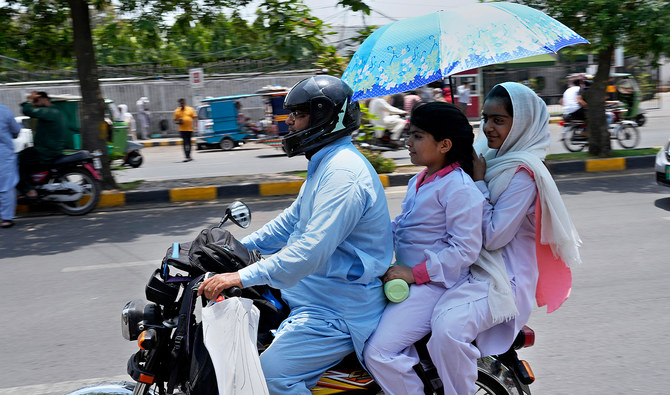
- Some 26 million students will be out of lessons from Saturday in Punjab as temperature soars
- Met Office has forecast three heatwaves, one underway and two set to hit in early and late June
LAHORE, Pakistan: Half of Pakistan’s pupils will be shut out of schools for a week as the nation takes crisis measures to lessen the effect of a series of heat waves, officials said Thursday.
Some 26 million students will be out of lessons from Saturday in Punjab, Pakistan’s most populous province, which has ordered schools to close for the summer break one week early because of the soaring temperatures.
The early closure was confirmed by a spokesperson for Punjab’s Education Department.
Pakistan’s meteorological office has forecast three heat waves — one already underway and two more set to hit in early and late June.
Temperatures in Punjab are currently six to eight degrees Celsius above normal, the disaster management agency said, with the provincial capital Lahore due for 46 degrees Celsius (111 degrees Fahrenheit) at the weekend.
The government’s Coordinator on Climate Change and Environment told journalists in Islamabad on Thursday that “global warming is causing a sudden change in weather patterns.”
Parts of Pakistan are facing power cuts of up to 15 hours as demand for fans and air conditioning surges, leaving students sweltering at their desks.
The Save the Children NGO said the 26 million Punjabi schoolchildren with lessons canceled account for 52 percent of pre-primary, primary and secondary students in Pakistan.
“Prolonged exposure to intense heat impacts children’s ability to learn and to concentrate and this puts their education at risk,” country director Muhammad Khuram Gondal said.
“Excess heat is also potentially lethal to children.”
The UN children’s agency UNICEF said more than three-quarters of children in South Asia — or 460 million — are exposed to temperatures above 35C (95F) for at least 83 days per year.
It warned that children are at risk of “dehydration, higher body temperature, rapid heartbeat, cramps... and coma.”
Pakistan is responsible for less than one percent of global greenhouse gas emissions.
However, the nation of 240 million ranks high among countries vulnerable to extreme weather events, which scientists have linked to climate change.
A third of Pakistan was submerged by unprecedented monsoon rains in 2022 that displaced millions of people.
It was also battered by above-normal rainfall last month that killed at least 144 people in the wettest April recorded since 1961, with more deluges forecast this summer.
Lahore’s students also saw lessons cut this winter when schools were shut as the megacity was enveloped by choking smog.
Pakistani exporters confident of increasing sales in Kingdom after encouraging response at ‘Saudi Food Show’
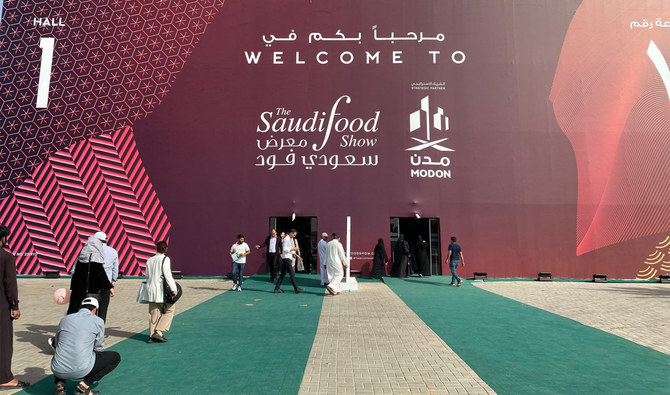
- Saudi Food Show, Kingdom’s largest food and beverages sourcing event, is being held in Riyadh from May 21-23
- Thirty Pakistani companies are among 1,000 exhibitors from over 97 countries taking part in the exhibition
KARACHI: Buoyed by an overwhelming response at the “Saudi Food Show 2024” being held in Riyadh, Pakistani food exporters on Thursday said they were confident of increasing their market share in the Kingdom.
The Saudi Food Show is the Kingdom’s largest annual event for food and beverage sourcing. The event is being held in Riyadh from May 21-23 where over 1,000 exhibitors from 97 countries are taking part in the exhibition. Among the exhibitors are also thirty Pakistani companies that are taking part in the event, the Trade Development Authority of Pakistan (TDAP) said.
“The annual demand for rice in Saudi Arabia is 1.2 million tons and Pakistan’s share is only 7 percent at present,” Chela Ram Kewlani, chairman of the Rice Exporters Association of Pakistan (REAP), told Arab News.
“We are expecting to increase our share after this exhibition.”
The Saudi groundbreaking platform convenes a distinguished global contingent of exhibitors, thought leaders, industry communities, strategic partners, innovative brands, and acclaimed chefs.
The Pakistan Pavilion at the event featured 30 companies comprising 15 from the rice sector, 12 from the processed food sector, two from the meat sector, and two from the dairy sector, the TDAP said.
Pakistani rice exporters hope to achieve a new milestone in exporting the product after India decided last year to ban rice exports.
India, the world’s top rice exporter, banned the export of non-basmati white rice last year to control its rising domestic food costs and maintain domestic supplies.
The move prompted Pakistan’s rice exports to increase by more than 80 percent this fiscal year to $3.28 billion. REAP officials hope rice exports will cross $3.5 billion mark by the end of the current financial year.
Praising the response received at the Saudi Food Show, Khalid Ghori, a representative of the leading Pakistani agribusiness Matco Foods Limited, hoped “the market will be fruitful for Pakistan in the coming days.”
“Large number of people including importers and exporters visited our stalls and we hope that the market will be very fruitful for Pakistani products,” Ghori told Arab News.
Pakistani food exporters also participated in a three-day major food and beverage trade show held last week in Canada’s Montreal.
SIAL Canada featured about 10 Pakistani companies that displayed various products including beverages, dairy products, rice, pink salt, sweet snacks, seafood products, fresh fruits, vegetables, dried fruits, frozen and ready-made products.
UAE president commits to investing $10 billion in Pakistan— PMO
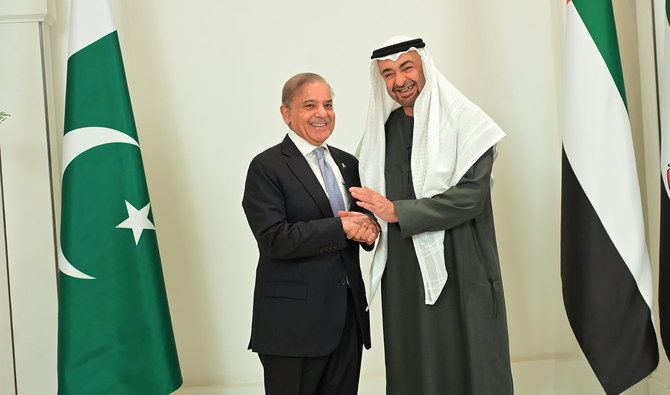
- PM Shehbaz Sharif calls on UAE president in Abu Dhabi during day-long trip to Gulf country
- UAE one of Pakistan’s closest allies, has frequently financially bailed out South Asian nation
ISLAMABAD: UAE President Sheikh Mohamed bin Zayed Al Nayhan on Thursday committed to investing $10 billion in multiple sectors in Pakistan during a meeting with PM Shehbaz Sharif, a statement from the Prime Minister’s Office (PMO) said.
Sharif met the UAE president in Abu Dhabi during his day-long trip to the Gulf country. The Pakistani prime minister arrived in UAE on Thursday with a high-level delegation amid a concerted push by Pakistan to seek foreign investment as it navigates a challenging path to economic recovery.
The UAE is one of Pakistan’s closest allies and has frequently bailed out the South Asian country, joining Saudi Arabia and China in rolling over billions of dollars of loans to Pakistan last year to help it clinch a last-gasp deal with the International Monetary Fund (IMF) and avoid a sovereign debt default.
The UAE is Pakistan’s third-largest trading partner, after China and the United States. Policymakers in Pakistan consider the Gulf state an optimal export destination due to its geographical proximity, which minimizes transportation and freight costs while facilitating commercial transactions. The UAE is also home to more than a million Pakistani expatriates and the second-largest source of remittances to the South Asian country, after Saudi Arabia.
“President of the UAE His Highness Sheikh Mohamed bin Zayed Al Nahyan assured UAE’s support in all circumstances and made commitment of investing $ 10 billion in multiple sectors in Pakistan,” the PMO statement said.
Sharif was accompanied by Deputy Prime Minister and Foreign Minister Muhammad Ishaq Dar, Minister for Commerce Jam Kamal Khan, Minister for Defense Khawaja Muhammad Asif and Special Assistant to Prime Minister Syed Tariq Fatemi in his meeting with the UAE president.
The PMO said Sharif and the UAE president discussed cooperation between the two countries in political, economic, social, cultural and defense sectors.
“Prime Minister underscored the importance of galvanizing existing cooperation and strengthening strategic partnership including in the field of information technology, renewable energy and tourism,” the PMO said.
Sharif conveyed his gratitude to the UAE leadership for hosting 1.8 million Pakistanis in the Gulf country and highlighted Pakistan’s “huge human resource potential” that he said could be engaged in multiple sectors, the statement said.
'JOINT INVESTMENTS, NOT LOANS'
Sharif earlier spoke at a roundtable conference in Abu Dhabi which was attended by the Pakistani and Emirati business communities.
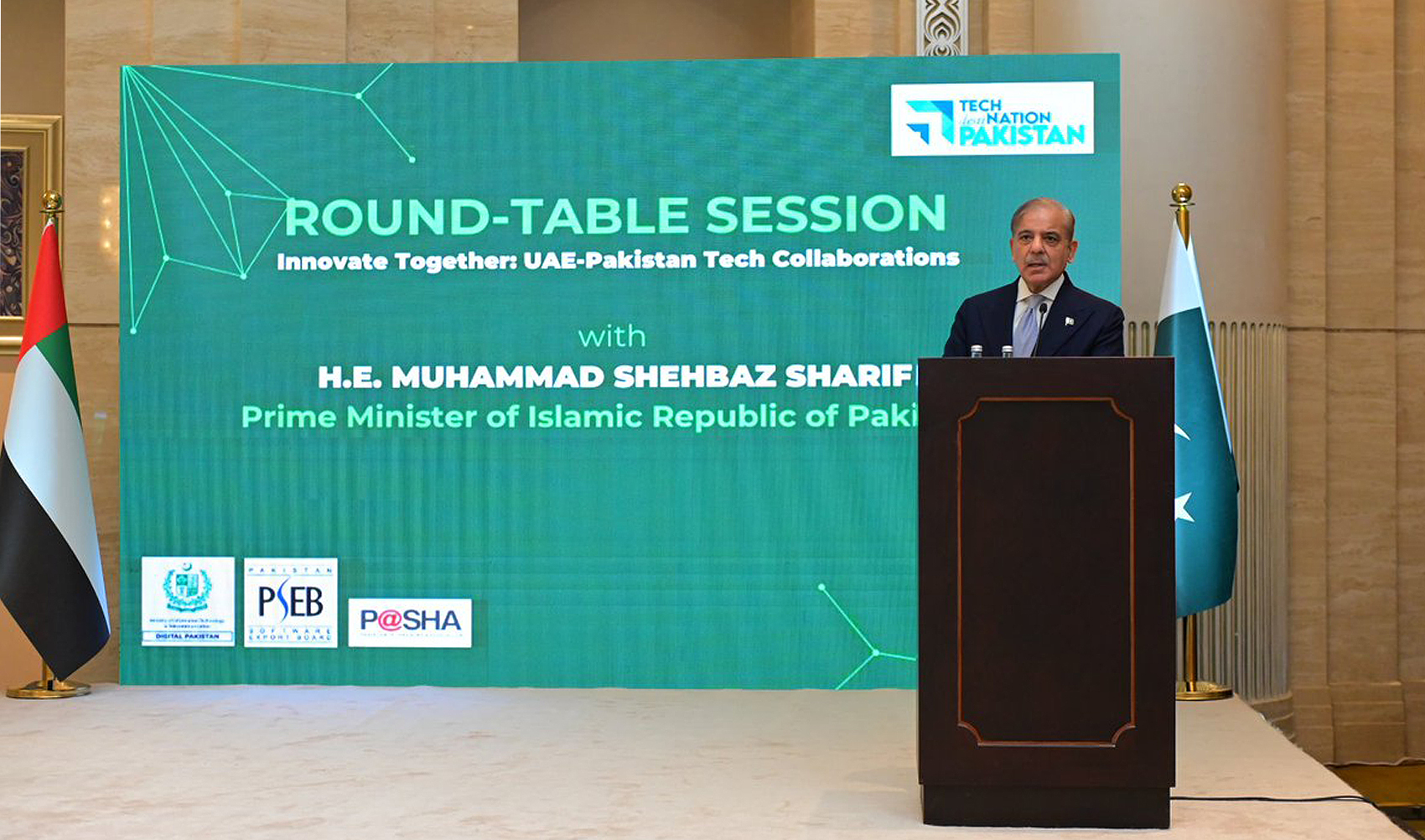
“Today I am here in this great country, this great brotherly country, not to seek loans but to seek joint collaboration, seek joint investments, which have mutual benefits … for the investor, and draw dividends through hard work, ingenuity, and by using modern tools and skills,” Sharif said.
Leading Pakistan and UAE businesses signed three agreements on information technology, energy and infotech during the conference.
Sharif also met Mohammed Saif Al Suwaidi, the chairman of the Abu Dhabi Fund for Development. The prime minister informed Al Suwaidi that Islamabad was introducing business-friendly policies and facilitating foreign investors in its bid to develop Pakistan’s private sector.
He separately met Abdullah Muhammad Al Mazrui, the chairman of the Abu Dhabi Chamber of Commerce and Industry, to discuss trade relations between Pakistan and the UAE as well as their business communities, the PMO said.
Pakistan has seen a flurry of foreign visits in recent weeks, including by the now deceased Iranian president, the Saudi foreign minister, a delegation of top Saudi companies as well as officials from Qatar, China, Japan, Turkiye and Central Asian countries, among others.
Reeling from high inflation, low forex reserves, and an unstable currency, Sharif has vowed to steer Pakistan out of its prolonged economic crisis by enhancing bilateral trade with allies and attracting more international investments. Islamabad is also currently in talks with the IMF to secure a new, longer-term bailout package of at least $6 billion.











